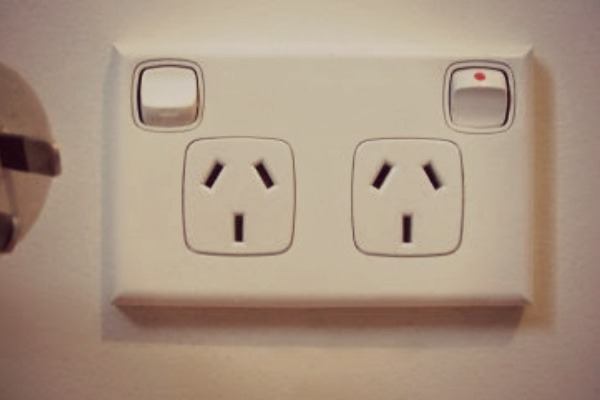
All homes experience electrical faults and while most are minor issues they sometimes are symptomatic of larger problems or can become major issues if not properly attended to.
Here are some common household electrical problems and how best to deal with them so you’re not caught short.
Power surges
Spikes and surges come as quickly as they go, usually after storms, and that can make them difficult to detect. Your appliances could be irreparably damaged if your home does not have adequate surge protection and replacing all of those damaged items could be quite expensive.

Storms usually cause surges.
Ask your electrician to check if you’re surge protected or install a good quality surge protector from a trusted brand. Also, consider switching out your power boards for surge protected ones — you can find out if they are by looking at the packaging. This will help protect your appliances from spikes saving you money in the long-run and giving you peace of mind.
Circuit overload
Not all homes have been wired with our modern lives and love for technology in mind, and this can lead to circuit overload — especially in houses built pre-1990.
We’re pretty good at forward thinking in Australia so most homes were future proofed when wired, but it’s better to be safe which is why Malcolm Richards, CEO of Master Electricians Australia, recommends you get your wiring checked if your home is older than 25 years
The most common cause for this is an overloaded power board, and you’ll know that your circuit breaker is working too hard when you’re constantly tripping the breaker.
So, to avoid overload, there’re a few things you could do.
- Unplug anything that isn’t in use (saves money too).
- Avoid plugging too many things into a power board at once. Six outlets don’t always mean you can plug six things into it at once.
- Always plug large appliances directly into the wall.
- Never piggyback power boards or extension cables.

Always plug larger appliances into the wall.
If you find you need a lot of power boards, speak to an electrician about installing additional sockets. This is safer than relying on power boards which pose a potential hazard as dust can collect in the pin recess.
Faulty breaker
If your home drops power, often you could have a faulty circuit breaker. It’s absolutely crucial that you get this checked out as the circuit breaker is a safety switch that protects your home from overload and damage.
Get this checked every few years or so any potential for future faults can be nipped in the bud.
Electric shock
We’ve all had little shocks when we flick a light switch, touch certain appliances or see that flash of blue light when we plug in something in the dark. Often it’s just static, and nothing to worry about, but it could be a sign of a fault with the appliance or wiring in your home.
Diagnosis is simple; plug the offending appliance in somewhere else and see if it happens again. If it does, then it’s a fault with the appliance but if not you could have a wiring issue. Despite this, it’s probably best to get a registered electrician to conduct a professional diagnosis from the start.
Flickering lights
Flickering lights are the common issue you shouldn’t ignore. Most times it’s just an old bulb struggling to hang on, but sometimes it is an indicator that the system is faulty. If your home was built pre-2005 the safest thing to do is get it looked at by a professional.

Flickering lights are a good indication something is wrong.
Hot fixtures
Hot power outlets, plug sockets and light fixtures could be a sign of a problem. Electricity naturally creates heat, but that heat should not permeate through your fixtures to the point it’s actually hot. Warm is normal. Hot is bad.
Every now and again it’s advisable to have a quick and careful feel of your fixtures to see if they are hot. If they are, it could be a problem, and needs to be inspected as soon as possible. Energy saving light bulbs are a good idea, too, as they not only they save money in the long run, but they emit less heat (making hot fixtures easier to identify).
Sparks and burning odour
If you smell burning, see scorch marks or sparks near plugs or outlets these are crystal clear signs your wiring is faulty, and must contact a professional electrician immediately. They will likely tell you to switch off the power to your home and unplug everything while you wait for them to prevent fires.
Electricity has made all of our lives easier, but it is not without risk. Home fires are not a nice topic to finish on, but it’s important that we’re all aware of the hazards of overloading our circuits or faulty wiring present. Build a relationship with a trusted electrician and help keep your electrics healthy.
You can get in touch with Fuse Contracting to learn more about seven common electricity problems, or to inspect your home. We’d love to hear from you!





